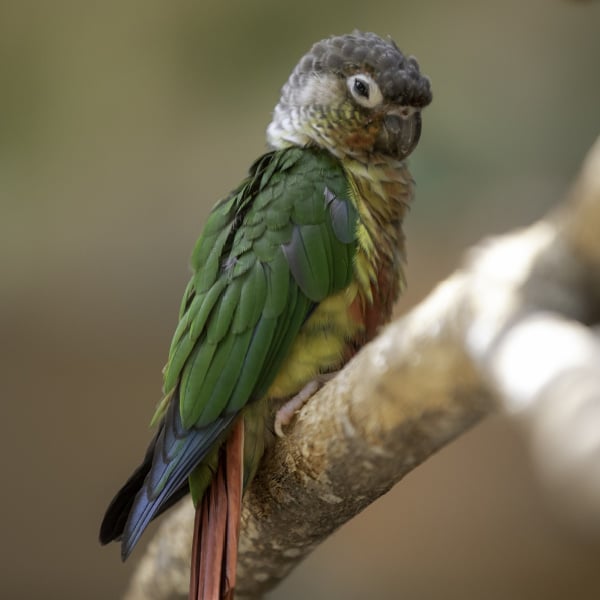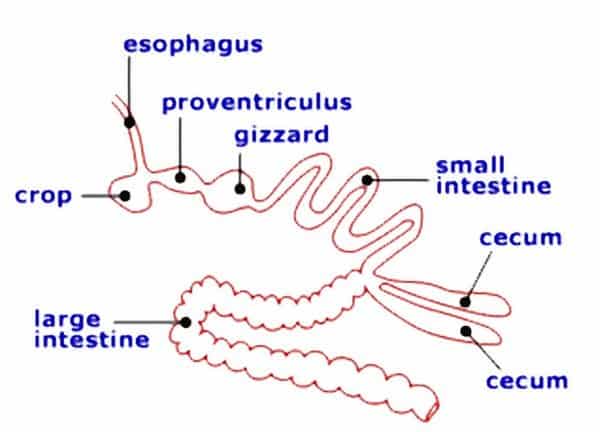Last Updated on by Mitch Rezman
Mona S. writes
I recently had the experience of seeing my beloved Green Cheek Conure do what I would describe as projectile vomiting, which absolutely scared me to nearly to death.
I have owned birds for about 30 years or so and had never seen anything like this.
Actually, I was not even aware that birds could vomit at all, except for regurgitating to feed their young.
This looked like someone had turned on the faucet for a couple of seconds.
Fortunately, he has been perfectly fine ever since.
Do you have any idea as to what could cause something like this to happen?
Thanks for your time (and for your very information Sunday Brunch emails).
Best regards,
Mona S.
Hi Mona
We appreciate your positive feedback about our Sunday get-togethers.
It’s your Sunday Birdie Brunch (not ours:-)
A labor of love.
Food ejected from a bird’s mouth comes in two forms.
Vomiting shoots everything in the proventriculus, ventriculus, and/or intestine, out.
The food will look like it’s in various states of digestion
You’ll notice your bird shake it’s head from side to side when vomiting.
Vomiting is a sure sign that your bird is sick and should be seen by a qualified veterinarian ASAP.
Then we have regurgitation.
Birds regurgitate the contents of their mouth, esophagus and/or crop.
If the food particulate shooting from the bird’s mouth appears to be undigested seeds and recently eaten foods, that’s regurgitation.
Remember digestive systems are designed in part to be defense mechanisms.
Much as a mammal in the wild defecates when it senses fear to make it lighter and faster (think deer), nature designed the crop to store food prior to digestion.
A crop regurgitation can occur when a bird is frightened and wants to fly away rapidly.
Emptying the crop lightens the load and enables faster flight.
Something I always bring into the convo is car sick bird regurgitation which I hear more of than I ever thought I would.
I mean they are birds and should be instinctual travelers.
Who knows, it could be exhaust fumes or the erratic motion of a vehicle as opposed to the flawless motion birds experience in flight.
In any case, I’ve read mind-numbing lists of things you can give your bird to avoid regurgitation prior to car travel.
Never could I determine how anyone had scientifically calculated the proper dosage of anything based upon a bird’s weight.
My old school technique for bird car sickness regurgitation avoidance is to simply not feed your pet bird for about six hours prior to terrestrial travel.
Will your bird be hungry?
Yes, but you will avoid the trauma a bird experiences during regurgitation.
How does a bird come to regurgitate or vomit?
Viral diseases like polyomavirus and psittacine beak and feather disease can trigger regurgitation.
Parasites like mites and tapeworms can trigger vomiting.
Bacteria like Salmonella and Pasteurella can trigger vomiting.
Excessive protein can trigger regurgitation.
Fumes from dangerous household products, like overheated Teflon can trigger vomiting and cause death.
Given this information, I hope you’ll be able to start detective work to determine the cause of your conure’s vomiting.
As for not seeing something like this in 30 years, there are a million things our birds can always teach us.
best of luck
mitchr
Rich M. asks
Have 18 yr old Blue Crown Conure that has developed all the symptoms of Ataxia.
Not much treatment info on the web.
He’s been slowly losing weight even though we feed him high iron baby food with a syringe.
Trying to keep him comfortable but he’s been falling off the perch occasionally at night and has difficulty perching during the day.
Any thoughts?
Hey Rich, I’m sorry to hear of the problems you’re having with your BCC.
Diagnosing illnesses like Ataxia is above my pay grade.
I don’t know if you had blood work done but the article points a finger at hypovitaminosis (vitamin deficiencies).
It may require some antibiotics as well.
This is a good start.
To keep your pet bird from injuring his or herself I would follow the parameters laid out in this post about handicap birds.
Keeping a pet bird low in the birdcage on flat surfaces will lower the risk of injury to your conure from a fall.
For weight gain, I would introduce some high-fat seeds like sunflower, walnuts, almonds, and cashews.
(Think McDonald’s french fries)
Lafeber’s Avi Cakes are a great foraging and enrichment food having 50% pellets inbound by molasses making them great to sprinkle powdered supplements on.
There’s another hack that I use employing wet food in order to provide a well-rounded avian nutritional supplement like HARI Prime avian supplement to your bird.
Essential to every birdcage is proper lighting.
The light should be on a timer providing 12 hours of light and 12 hours of darkness (covering the cage and night) and disrespecting daylight savings time.
This will reduce stress which aids in healing.
I hope we have helped.
Please keep us posted on the health of your Blue crown conure.
Rick F. asks
Hello, I have been reading your blog regularly.
I have a 14-year-old sun conure.
I am hoping your expertise and experience can maybe give me another perspective as to what may be wrong with him.
Starting in October he was very slow to open his eyes in the morning.
I brought him/her to his vet as it was time for his annual checkup anyway.
The vet thought he may have a vitamin A deficiency.
He gave him a vitamin A shot and I brought him back two weeks later for another shot.
We also increased his daily vitamin and increased foods rich in vitamin A.
He also prescribed a steroid eye drop be administered twice a day.
He initially improved, but by late November he seemed to be having his eye problem again as well as being generally quiet/borderline lethargic.
I brought him back in the second week of December.
This time the vet diagnosed him with an upper respiratory infection.
He prescribed an antibiotic as well as a non-steroidal eye drop – both administered twice a day.
His droppings were tested and all was normal.
A blood test was normal.
He has lost weight the last 4 months though – even though he still eats normally as he always has.
Right before Christmas, he started to get better energy wise and the vet (via telephone) attributes that to the antibiotic working and said to stay on it an additional week.
Fast forward to today.
He has some good days and some very “quiet” days.
This concerns me. His vet will not be back until next week.
Generally, he’s just lower energy.
He has trouble opening his eyes in the morning or after long naps.
Putting his drops in first thing in the morning allows him to almost immediately open his eyes.
He eats but not like he used to.
He has been going through a few molts the last few months but has generally nice/normal plumage.
He does sleep more than usual – puffs up and sleeps on one foot – or sleeps in his fuzzy hut like normal.
I’m just not sure what to do?
Get another vet’s opinion?
Stay with the same vet and ask for additional tests…?
Not sure what to ask for.
Or is all this a normal part of aging.
He is 14.5 years old.
Any insight you can give would be very much appreciated.
Thank you!
Rick
Hi Rick
In that, the vet thought he may have a vitamin A deficiency?
A blood up would provide the exact data – Find a new vet
The weight loss is a red flag of deeper symptoms
I would advocate an X-ray to see if there are any tumors.
Please keep us posted
best
mitchr
Hi Mitch and Catherine,
One can try purchasing medication if there are no vets BUT there is no way to be sure what you need to treat without knowing if the vomiting is normal budgie behavior; obstruction; bacterial; fungal; viral; protozoan or a combination and using the wrong choice will waste time by not helping and may result in a bad outcome.
Author Profile
Latest entries
 Feeding Exotic BirdsDecember 29, 2025How to Switch or Convert Your Bird From Seeds to Pellets: Real-Life Case Studies and Practical Guidance
Feeding Exotic BirdsDecember 29, 2025How to Switch or Convert Your Bird From Seeds to Pellets: Real-Life Case Studies and Practical Guidance Feeding Exotic BirdsDecember 16, 2025A Practical, Budget-Smart Guide to Feeding Birds Well
Feeding Exotic BirdsDecember 16, 2025A Practical, Budget-Smart Guide to Feeding Birds Well Bird EnviornmentsDecember 7, 2025Understanding Budgie Cage Bar Orientation: Myths, Realities & Practical Solutions for Vertical-Bar Bird Cages
Bird EnviornmentsDecember 7, 2025Understanding Budgie Cage Bar Orientation: Myths, Realities & Practical Solutions for Vertical-Bar Bird Cages Feeding Exotic BirdsDecember 5, 2025How Dr. T.J. Lafeber Rewrote the Future of Pet Bird Nutrition
Feeding Exotic BirdsDecember 5, 2025How Dr. T.J. Lafeber Rewrote the Future of Pet Bird Nutrition




